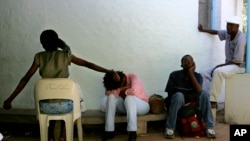A baseline survey conducted by the Disability, HIV/AIDS Trust (Dhat) has shown that Zimbabweans living with visual impairments are having difficulties in accessing HIV/AIDS information.
Speaking to Studio 7, Hamida Ismail Mauto, Dhat head of operations said the failure by the visually impaired in Zimbabwe to access information in appropriate formats had left them exposed to HIV/AIDS.
“The youth are calling for information so that when they experience issues related to HIV/AIDS they quickly understand and they will know that for example if they have a lymph node under the arm what does it mean. We need to translate the pictorial into Braille.”
Mauto said Dhat has partnered with Progressio to translate available information on HIV/AIDS into appropriate formats for the visually impaired that include Braille and audio.
“The Information gets to them late. Its outdated by the time it gets to them and as Dhat we need to be able to keep abreast with the information and adapt new information as it comes and try and distribute it in a format that people with visual impairment will understand.”
Tsitsidzashe Mashingaidze, a visually impaired second year student at the University of Zimbabwe’s Social Work Department confirmed to Studio 7 that it has been difficult to access information on HIV/AIDS.
She is happy that Dhat will now be helping them in accessing current information on HIV/AIDS.
“It was not perfect that we could understand well and we are suggesting and we are being given the opportunity to say what we want to be done for us to understand much on HIV/AIDS.”
Sylvestor Zhou, who is also visually impaired, said the provision of HIV/AIDs information to the visually impaired will help them to be safe and also enable them to know how to live positively for those who get infected.
“This programme will help in widening the scope in which the visually impaired can access information. Information was coming but it was outdated and sometimes for those who are visually impaired we were lagging behind in having HIV/AIDS information.”
In Zimbabwe, usually disability and poverty are inseparable. Zimbabwe ratified the United Nations Convention on the Rights of Persons with Disabilities where it committed itself to align its policies and laws to the dictates of the international instrument but not much is visible on the ground to show the commitment.




